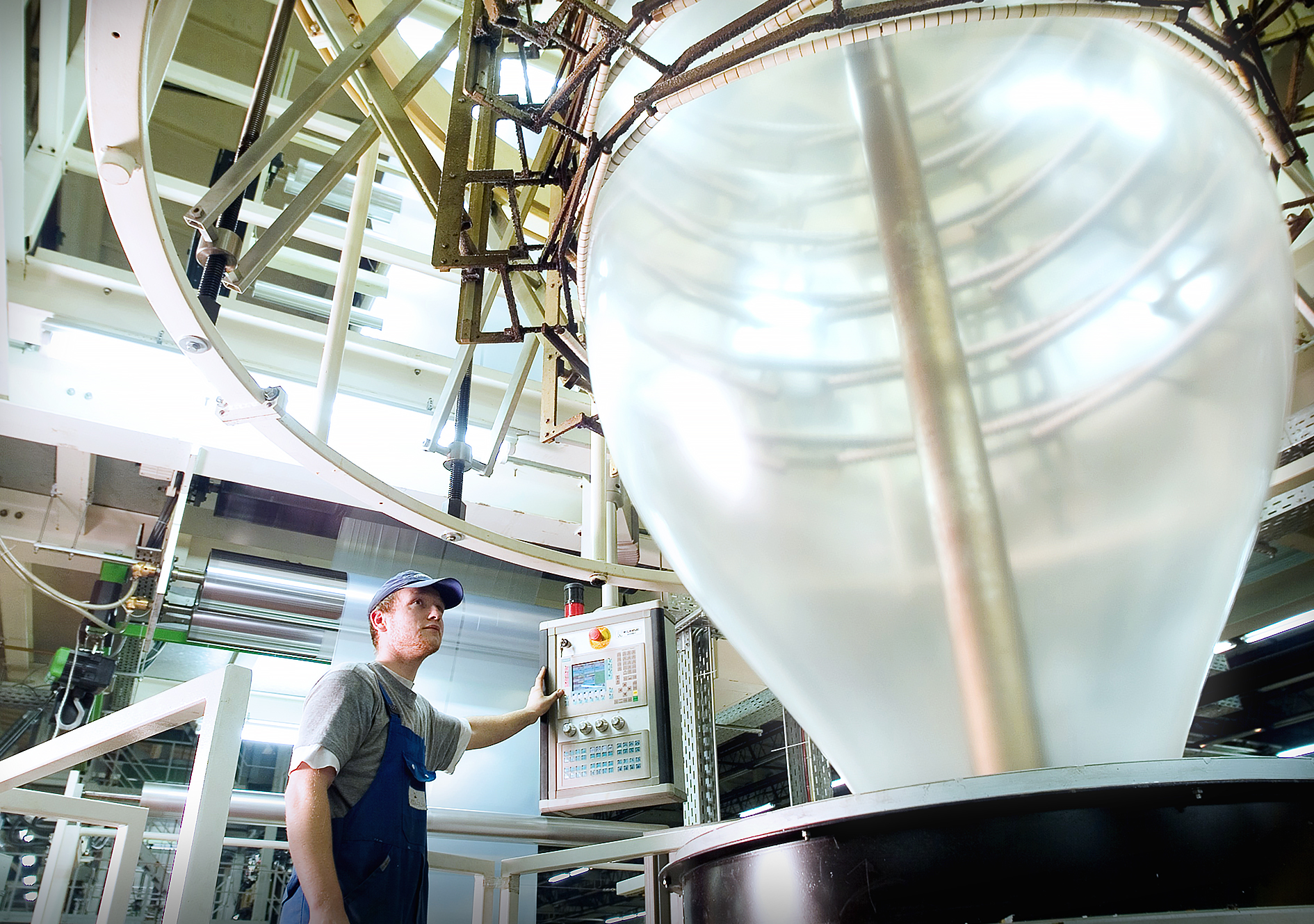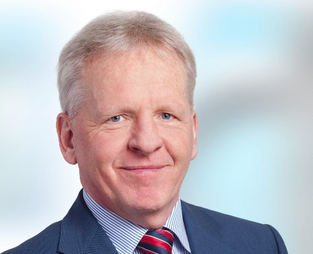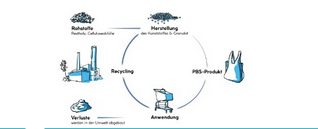
In the RUBIO project, 18 partners are turning the vision of a sustainable plastics industry into reality. Their goal is to use regionally available plant residues to create versatile, sustainable products that are recyclable and biodegradable. As part of the project, the Fraunhofer Institute for Applied Polymer Research IAP is developing new types of the bioplastic polybutylene succinate (PBS) so that it can be used for significantly more applications. Together with the company POLIFILM EXTRUSION GmbH, the Fraunhofer IAP has developed an initial commercial product.
Bioplastics are increasingly providing an alternative to petroleum-based plastics. These sustainable materials offer a number of advantages: They are made from renewable resources and help to reduce the dependence on fossil fuels and CO2 emissions into the environment. They can be biodegradable and have processing properties comparable to those of classic petroleum-based plastics. Like classic plastics, bioplastics can be sorted, fractionated and recycled.
Why aren’t petroleum-based plastics simply replaced by bioplastics?
Despite the high potential, there are a number of factors that prevent companies from manufacturing their products from bioplastics: Worldwide, there are only a few manufacturers offering bioplastics on the market. For plastics processors, this causes problems with ensuring supply, higher costs, and a too limited choice of different types of bioplastics to realize the wide range of possible applications. In addition, there is a need for technical improvement and it is often not clear for which specific applications bioplastics are suitable. Finally, bioplastics are currently often produced from sugarcane and corn – potential food or feed sources, which could raise a kind of “food or plastic” discussion.
New PBS types enable more diverse areas of application
Therefore, the need for developments in this field is great. Experts from the Fraunhofer IAP are tackling these hurdles together with partners from science and industry in the BMBF-funded project “Regional Entrepreneurial Alliance for the Development of Value Added Chains for Technical Bioplastics in Central Germany” RUBIO; (funding number: 03RU1U024A).
Dipl.-Ing. Thomas Büsse, who coordinates the joint project “Processing” at RUBIO and heads the Processing Pilot Plant for Biopolymers (located in Schwarzheide in Brandenburg, Germany) of Fraunhofer IAP, explains: “Depending on the application or processing technology, the plastic used must be hard or soft, perhaps also high or low viscosity can be required. However, there are only three types of PBS on the market, and these are suitable only for a limited number of processing methods and applications.”
For this reason, the team in Dr. Antje Lieske’s department “Polymer Synthesis” of Fraunhofer IAP in Potsdam, Brandenburg, Germany, is developing entirely new types of PBS that can be processed using a much wider range of methods – for instance from blow molding to injection molding. Thus, the researchers are also increasing the portfolio of possible applications.
The know-how of the polymer specialists at the Fraunhofer IAP goes far beyond the mere development of synthesis processes for new types of bioplastics. In the synthesis pilot plant of the Fraunhofer Pilot Plant Center for Polymer Synthesis and Processing PAZ in Schkopau, Saxony-Anhalt, Germany the team led by Dr. Ulrich Wendler, head of the “Synthesis and Product Development” department at the Fraunhofer IAP, is transferring the results from the laboratory and pilot plant to an industrial pilot scale. The question of how the newly developed plastic types and blends can be thermoplastically processed is being intensively investigated in the processing pilot plant. Tests on biodegradability, printability, sealability or machinability are also carried out here – criteria that the researchers can set individually at the customer’s request. Recyclability is also tested in the RUBIO consortium.
“The important thing is that bioplastics can and must be recycled. Degradability only comes into play when large or small plastic particles are lost during use and thus end up in the environment,” Büsse emphasizes.
Within the framework of the RUBIO project Fraunhofer IAP and POLIFILM EXTRUSION GmbH have achieved a first success. The German company produces plastic films for various applications in the packaging, construction, agricultural, automotive and other sectors on more than 80 extrusion lines at its Weißandt-Gölzau site in Saxony-Anhalt. The partners have developed a PBS film that can be used for shipping bags.
“This cooperation is an important step towards sustainability and allows us to offer products made from regional waste materials that are recyclable and additionally biodegradable if lost to the environment. Another advantage is the processing on common extrusion lines, so that nothing stands in the way of the triumphal march of PBS materials,“ explains Tobias Otto, Project Manager R&D at POLIFILM EXTRUSION GmbH.
No “food-or-plastic” discussion due to regional plant residues
The development of the new PBS film goes even further, because so far the bioplastic is not yet based on regional raw materials. But that will change in the further course of the cooperation. Plant residues from the region will be the raw material in the future.
“In principle, all materials that contain cellulose or lignocellulose can be used. This includes unrotted fermentation residues from biogas plants, residues from farms that occur in a variety of forms, or theoretically even waste from paper production,” explains Thomas Büsse. Ideally, the use of regional residual materials has another advantage in the long term: Shorter transport routes can lead to lower prices and greater sustainability of the plastic products produced.

Thomas Büsse is head of the Processing Technology Center Biopolymers Schwarzheide of the Fraunhofer IAP and coordinates the joint project “Processing” at…
To the Processing Pilot Plant for Biopolymers
Activities of the Fraunhofer IAP
- synthesis of new PBS types
- plant and process development
- pilot scale sample production
- thermoplastic processing of newly developed plastic types and blends
Bioplastics based on PBS
- production from regionally available plant residues
- not in competition with food production
- recyclable and biodegradable
- for versatile products
![BMBF_CMYK_Gef_M [Konvertiert]](https://www.iap.fraunhofer.de/en/press_releases/2023/bioplastics-become-more-attractive-for-industry/jcr:content/contentPar/sectioncomponent_cop/sectionParsys/imagerow/imageComponent1/image.img.jpg/1682085426034/Sponsored-by-BMBF-english.jpg)
Source
Fraunhofer IAP, press release, 2023-04-24.
Supplier
Bundesministerium für Bildung und Forschung (BMBF)
Fraunhofer-Institut für angewandte Polymerforschung (IAP)
POLIFILM
Share
Renewable Carbon News – Daily Newsletter
Subscribe to our daily email newsletter – the world's leading newsletter on renewable materials and chemicals












